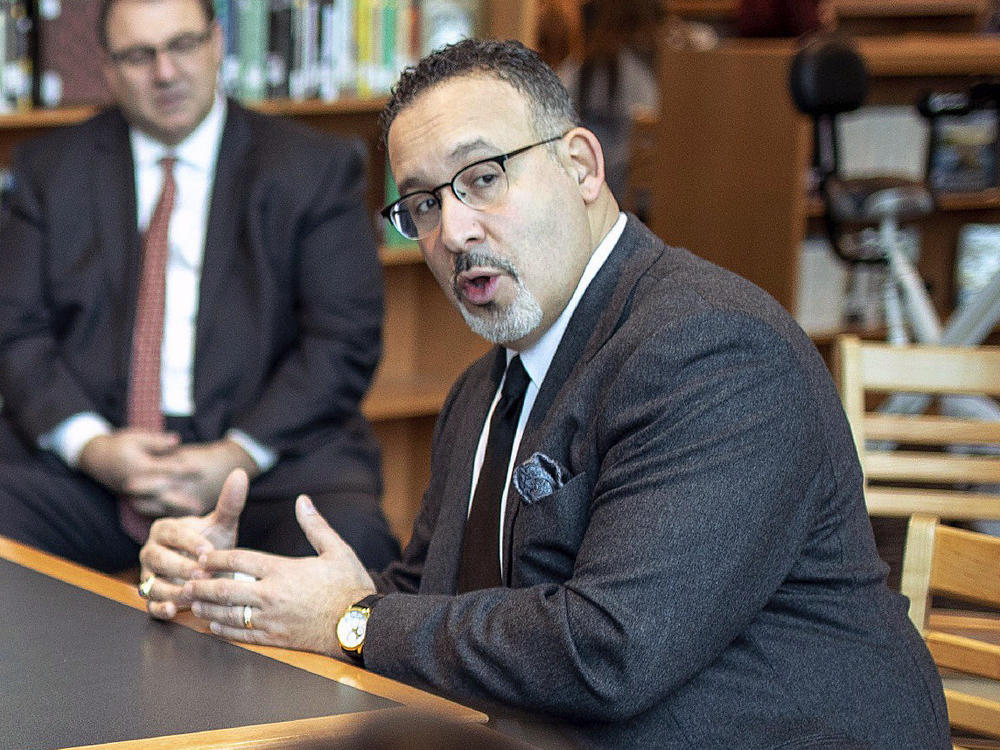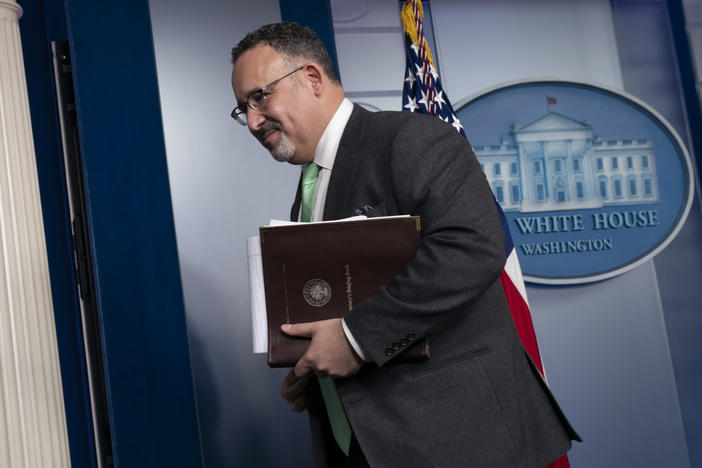Section Branding
Header Content
Biden Picks Connecticut Schools Chief Miguel Cardona As Education Secretary
Primary Content
Updated at 7:43 p.m. ET
President-elect Joe Biden plans to nominate Miguel Cardona, the head of Connecticut's public schools, to be his secretary of education.
In a statement Tuesday evening, Biden called Cardona a "lifelong champion of public education."
Cardona makes true on an early Biden promise to pick an education secretary who was a teacher: "A teacher. Promise," Biden told the National Education Association, the nation's largest teachers union, back in July 2019.
Cardona became the top education official in Connecticut in 2019 after being an assistant superintendent in the school district in Meriden, Conn., which serves nearly 9,000 students. It's the district Cardona grew up and went to school in, and also where he started his career in education as an elementary school teacher. He was a principal there for 10 years and was named the state's principal of the year in 2012.
The Congressional Hispanic Caucus put its support behind Cardona in a letter to Biden last week.
Cardona's parents are from Puerto Rico and lived in public housing when they moved to Connecticut. Biden has said he plans to establish "the most diverse Cabinet in history."
Much of Cardona's recent tenure has focused on reopening the state's schools during the pandemic. According to The Connecticut Mirror, a local newspaper, about one-third of the state's public school students currently are able to attend school in person full time. Like many state and district leaders across the country, Cardona has been balancing demands from teachers unions and parents amid budget constraints.
"Yes, we're in a health pandemic, but this is also an education emergency," he told The Mirror in August. "We have to accelerate our efforts because COVID accelerated disparities. We have to really double down and put our heads together to do what's best for kids and for the community. And that includes making sure that health and safety stay at the top of the conversation."
This experience is attractive for a Biden administration that faces major challenges in getting America's children back to school amid the pandemic. Nevertheless, Biden has said this will be a main focus: pledging to get the "majority" of schools open in the first 100 days of his administration.
Increasing school funding will also be a top goal of the Biden administration. The U.S. Education Department controls only around 10% of the dollars spent on K-12 public education in this country. A lot of that comes through the $16 billion Title I program, which goes to schools serving the most high-poverty students. Biden has proposed tripling that funding. On higher education, he has proposed forgiving student loan debt and making community colleges tuition-free.
With those priorities in mind, the next education secretary will inherit a litany of challenges and tight deadlines. Here are five things that could top the next secretary's to-do list:
1. COVID-19 school reopening plans
Just as current Secretary Betsy DeVos had little power to push schools into reopening, her successor will also have limited leverage to back Biden as he, too, tries to encourage a return to in-person learning. After all, federal funding for schools flows through Congress.
Perhaps the most important role Biden's new education secretary can play is a symbolic one: using the department's bully pulpit — as DeVos did to advocate for school choice — to speak to the needs of the nation's public schools and the more than 50 million children who depend on them.
It's worth noting that, the new secretary will help shape — and defend — the Biden administration's first education budget proposal. This may be the first, best opportunity to secure new funding to help schools that have been wracked by pandemic-driven budget cuts, especially in historically underfunded districts where low-income students and students of color have been hit hard and lost months of learning.
"The Secretary of Education must use his or her platform to lead a nationwide conversation about education through a racial equity lens," John B. King Jr., DeVos' predecessor, and Marc Morial, head of the National Urban League, wrote in a recent op-ed. "That conversation must center on the needs of students from marginalized communities, clearly illuminate the impacts of the pandemic, and demonstrate how those impacts interact with and exacerbate hundreds of years of systemic racism."
Districts are already considering efforts to mitigate learning loss, including extending the school year and hiring tutors. But they'll need help paying for those efforts, and a persuasive champion in the Education Department who can make the case to Congress and the American people.
2. To test or not to test
In the spring, as school districts across the country grappled with the challenges of remote learning, DeVos waived the federal requirement that students take the usual, year-end standardized tests. She has so far refused to issue a new waiver for 2021, but the next secretary certainly can. The question is will the next secretary? Or should the official?
The issue of testing has created a rift between traditional education allies — with teachers unions generally opposed to testing, and many civil rights groups arguing these tests are necessary to understand who has fallen behind, and how far have they fallen, since schools first closed in March.
3. Pandemic relief for student borrowers
Much has been made of whether, or how, the Biden administration would try to erase the debts of millions of student borrowers, but the more pressing question for his education secretary will be whether to extend the current moratorium on repayment for the more than 40 million borrowers with federal student loans.
DeVos pushed the deadline to Jan. 31, but it seems likely, with the economy still struggling, that the Biden administration will want to give borrowers at least a few more months of breathing room. The next secretary will also have to grapple with the risks of such an extension, says Clare McCann, who studies higher education policy at New America, a liberal-leaning think tank.
"The further you get from people making payments, the harder it's going to be to reengage with those borrowers and to get them back into the habit of making payments and kind of get back in touch with them," McCann says.
4. Restore Obama-era guidance
One of the easiest things for an incoming administration to do is to scuttle guidance issued by its predecessor. DeVos used her authority to rescind Obama-era guidance that encouraged school desegregation efforts, allowed students to use facilities consistent with their gender identity and protected students of color from "discriminatory discipline."
The discipline guidance threatened schools with a federal investigation if suspension and expulsion rates revealed significant racial disparities. Fatima Goss Graves, head of the National Women's Law Center, said in August that "racist school discipline policies continue to limit the learning opportunities and compromise the safety of Black, Latina and Native girls in this country. Schools — in whatever form they exist in this year, and beyond — should commit to changing these inequities and creating environments that are inclusive and supportive."
The incoming secretary could not only reissue this guidance but could also strengthen it and issue new guidance.
5. Relief for defrauded borrowers
The rule known as borrower defense presents the next secretary with the policy equivalent of a Rubik's Cube. The decades-old rule was rewritten by the Obama administration in 2016 to help refund borrowers who had been defrauded by for-profit colleges and universities, including Corinthian Colleges and ITT Technical Institute. DeVos considered it too generous and undertook a rigorous rewrite, but that 2019 version was considered so extreme that a bipartisan Congress voted to block it, forcing President Trump to use a rare veto.
The next secretary will inherit an unpopular rule that is currently being contested in court but could be difficult to replace quickly as well as a backlog of tens of thousands of borrower claims. Much of that backlog should fall under the previous iterations of the rule and can likely be processed, but the department will also have to ramp up investigations into the many other schools, beyond Corinthian and ITT Technical Institute, that borrowers claim misled them.
Copyright 2020 NPR. To see more, visit https://www.npr.org.
Bottom Content




